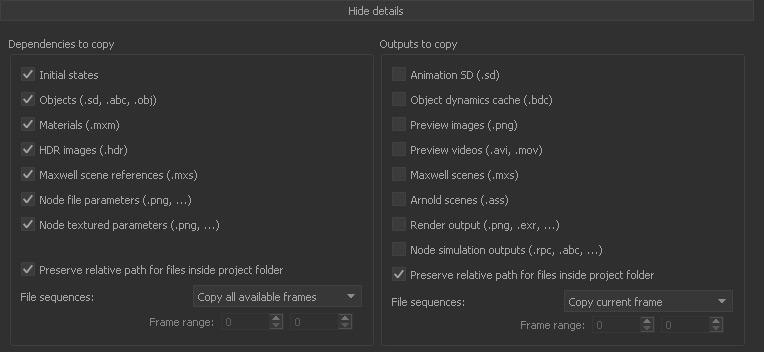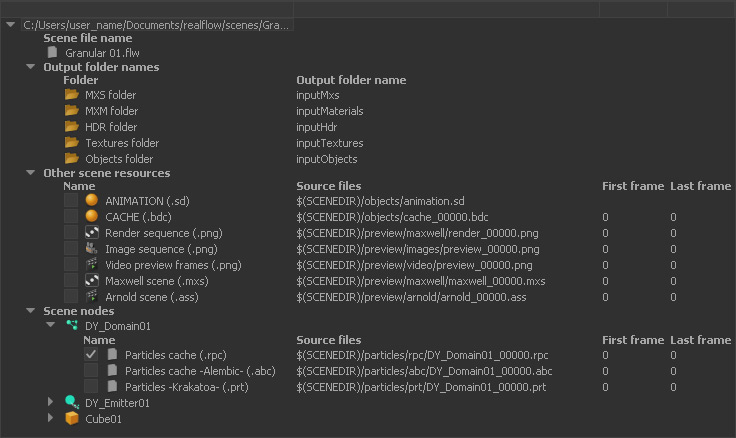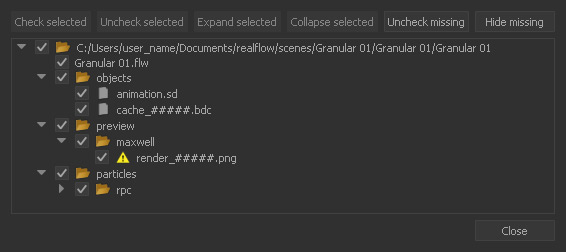Pack and Go
With "Pack and Go" you are able to save a zipped version of a project, e.g. if you want to create a backup or share files with other artists. You decide which dependencies and simulation files will be included with the archive. The function is located in RealFlow's main menu under File > Pack and Go... A new dialogue appears:
This function includes a set of dependencies like objects, HDR maps, MXS scene files, textures, or Maxwell materials. Some output files are also added to the archive by default, e.g. animation and dynamics data, or different map types.
These standard resources can be changed in the → "Pack and Go" preferences ("Export" section).
If you are happy with the default setting you only have to define the folder of the scene you want to pack ("Output folder"), specify where the archive will be saved ("Output zip folder"), and press "OK".
Output folder
This field contains the path to the scene currently opened. If you want to pack a different project, click on the "..." button or type in a new path manually.
Output zip file
Here you find the location where the ZIP archive will be saved. If necessary, enter a new path or browse to a new directory with the "..." button.
Show Details: Copy
When you click on this button you have full control over the file types you want to add to the archive together with a summary, showing details about the included resources:
Dependencies to copy
Dependencies are files the project needs for a correct simulation:
- Typical dependencies are external objects from SD or ABC files, HDR maps for → imaged-based lighting, or → parameter maps for controlling attributes like friction or bounciness.
- Your settings affect the checkboxes of the "Other scene resources" section in the summary area (see below).
If you want to preserve the project's relative paths leave the appropriate checkbox enabled.
Finally it is also possible to specify how to deal with "File sequences". Just choose one of the options and adjust the "Frame range" if necessary.
Outputs to copy
Here you can choose which simulation file types you want to add to the archive on a global level:
- "Global" means that these settings will affect all simulation nodes.
- If you want to specify resources for a specific node just go to the summary section (see below).
"Output to copy" does not only include particle, mesh, or dynamics files, but also previews, and Maxwell or Arnold render scenes. A prerequisite is, however, that the appropriate resources have been saved at simulation time: "Pack and Go" can only copy what is really there.
If you want to preserve the project's relative paths leave the appropriate checkbox enabled.
Finally it is also possible to specify how to deal with "File sequences". Just choose one of the options and adjust the "Frame range" if necessary.
Show Details: Summary
This area provides a complete summary of the archive and all resources are organized as a tree. The first four branches are for informative purposes only and cannot be changed:
Other scene resources
Here it is possible to fine-tune which file types you want to add to the packed archive. Your settings affect the checkboxes of the "Outputs to copy" section.
Scene nodes
If you want to specify which resources will be included with the archive then
- expand the appropriate node
- check one or more export resources.
Of course, the checked resources must actually exist, because "Pack and Go" can only copy what has been simulated and is really there.
Show Output Tree
A click on this button reveals a preview of the zipped archive, its internal structure, and how the simulation files will be organized:
- Expand the branches to see what will be included.
- Make final changes on what is going to be added to the archive.
- A warning sign tells you when a checked resource does not exist, e.g. when it has not been saved with the simulation.
Several buttons for bulk actions help to speed up the workflow with large scenes.



